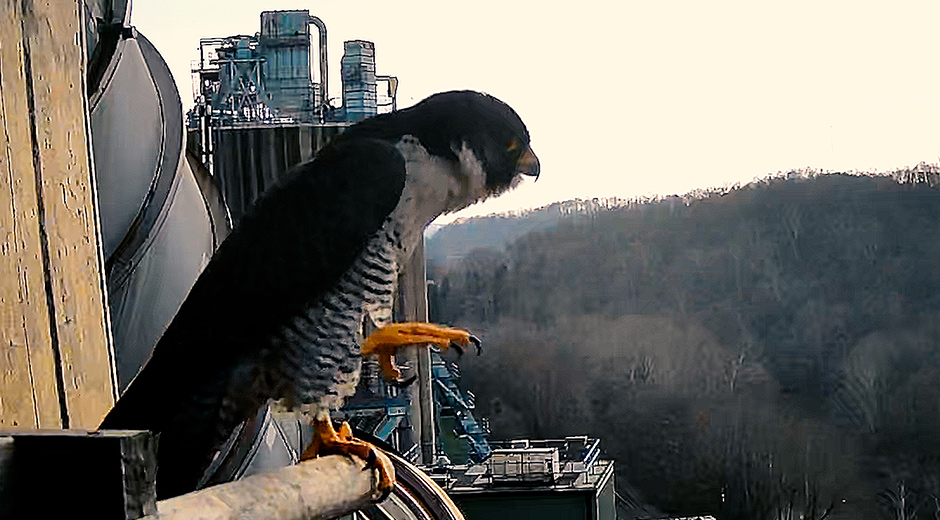Falcons Take Up Residence at Harrison Power Station, Helping Control Pigeon Population
One late-winter morning, Technical Services Manager Ed Murphy from FirstEnergy subsidiary Mon Power went up in Harrison Power Station’s stack to routinely inspect operations. He came back to the office with exciting news: peregrine falcons had taken up residence on the wooden platforms his team had installed last spring to deter pesky pigeons from the area while also giving falcons a safe space to nest.
“Pigeons are attracted to the warmth and shelter our plant provides, and our previous attempts to deter them from the area have not been successful long-term,” said Murphy. “Installing nesting boxes helps attract falcons to control the pigeon population naturally.”
Pigeons create a mess where they are roosting, and their droppings present safety and health concerns for plant workers. As prey, pigeons know to stay away from an area where falcons live.
The nesting boxes are filled with 75 pounds of gravel that falcons like to use to nest, and one of them is located on the fifth story of the stack. That winter morning, Murphy said he peaked out the door on the fifth floor and saw a bird fly out of the box screeching.
“I thought to myself, success!” he said. “We finally have a more natural, environmentally friendly way to keep the plant clear of pigeons and their droppings.”
Murphy and his team immediately refreshed themselves on the laws and rules that must be followed to keep the falcon living at the stack. They installed a wildlife camera in the area and then, for safety, locked the access doors to the two areas where bird boxes sit. They also installed signage alerting people to the bird’s presence.
After reviewing the footage captured over the last two months, the crew at Harrison believe there is not one, but two falcons living on site—and they’re pretty sure they can hear chicks chirping inside the box located on the stack.
According to Amy Ruszala, FirstEnergy’s in-house avian expert, falcons were on the Endangered Species Act for a long time, and this opportunity at Harrison gives the birds an environment to thrive and raise their young while taking care of a pigeon problem at the same time.
The U.S. Department of Agriculture has federal jurisdiction over raptors. When the company let the agency know about the falcons at Harrison, they were excited to hear the news because falcons hatched at power plants have the highest success rate for reaching maturity.
Protecting birds is nothing new to FirstEnergy and its electric companies. The company has made great strides enhancing its avian protection efforts, including the implementation of drones to complete bird nest inspections and deployment of a mobile app that allows utility personnel to report avian issues in real time, streamlining the process to protect nesting birds and enhance electric service reliability. These ongoing efforts continue to help reduce operational issues caused by nesting birds.
MEDIA CONTACT: Hannah Catlett, (440) 554-5346

